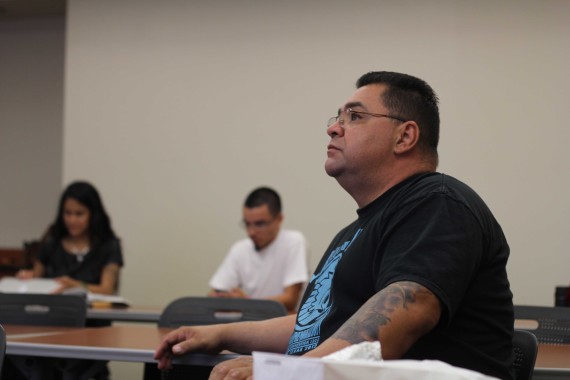Not all people believe the label of Hispanic is an apt term, although Sept. 15 to Oct. 15 is nationally recognized as Hispanic Heritage Month.
More than 78 percent of UTEP students are of Hispanic decent, according to the 2013-2014 factbook.
Director of the Chicano Studies Department, Dennis Bixler-Marquez, said the categorization was adopted by the U.S. Census Bureau to better describe people who didn’t fall under black, white or Asian ethnicities.
“It’s really an umbrella type of term, just like Asian,” Bixler-Marquez said.
In 1976, U.S. Congress passed Public Law 94-311, after years of lobbying by Mexican-American and Hispanic organizations, who wanted to be officially recognized as part of a separate ethnic group.
The law meant Hispanics or Americans of Spanish decent could be recognized in the publication of economic and social statistics, such as the U.S. census.
At the time, the law cited that 12 million Americans identified themselves as being from a Spanish-speaking background and traced their origin from Mexico, Puerto Rico, Cuba, Central and South America and other Spanish-speaking countries.
But the Hispanic label may be seen by some as problematic.
A 2012 survey by the Pew Research Center revealed that most Hispanic adults did not identify with the government-mandated term.
A slight majority of survey respondents, 51 percent, said they most often identified themselves with a country of origin. Only 24 percent said they preferred a broad umbrella label and 69 percent said Hispanics in the U.S. include a variety of groups, rather than a single culture.
Ramon Alvarez, senior mechanical engineering major, was born in Puerto Rico and identifies himself as both Puerto Rican and Hispanic.
“Puerto Rican is more heartfelt, I feel more tied to that. As a community, Hispanics should be one, we’re all tied together,” Alvarez said.
Visiting assistant professor of history, Selfa Chew, finds the Hispanic label problematic because of its racial implications.
She said Hispanic doesn’t recognize the indigenous roots that many people come from, it focuses instead on Spanish ancestry.
“In a racist Eurocentric society, the Spanish have more prestige than the indigenous,” Chew said. “We come from different origins. That definition has been imposed by a
dominant society.”
Chew also said that it’s very difficult to find the perfect alternative to the term Hispanic, but an effort can be made by asking different communities how they prefer to be identified.
“I think the most important thing is to recognize that we have an enormous diversity of people,” Chew said.
Arturo Chavez, senior Chicano studies major and president of Movimiento Estudiantil Chicano de Aztlán, said he identifies with the term Chicano because, unlike the word Hispanic, it does not negate his indigenous heritage.
“When we look at the word Chicano, many believe it comes from the Aztecs,” Chavez said. “When you use the term Hispanic, it’s like saying ‘I’m white too.’”
Denise Manriquez, senior anthropology major, believes people are okay with the term Hispanic because they haven’t learned more about it.
“The term Hispanic dilutes or completely ignores our connection to our roots,” Manriquez said. “I think the majority of people do not mind being called Hispanic because they do not know the difference. Others simply do not care to acknowledge let alone defend their roots.”
Bixler-Marquez believes people might identify with the term because it gives them a European connection, a continental origin. He also believes that a broad term such as Hispanic has its own usefulness that can better help us understand the Hispanic population.
Maria Esquinca may be reached at the [email protected].






